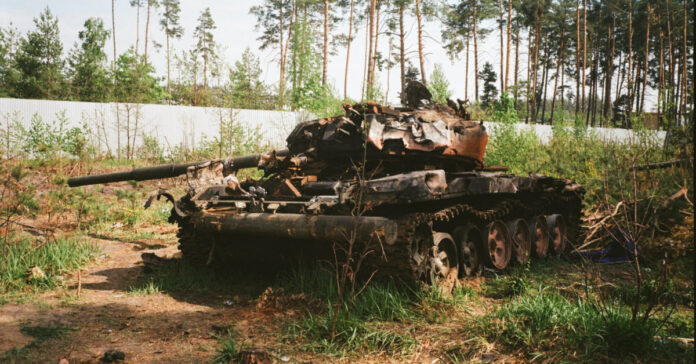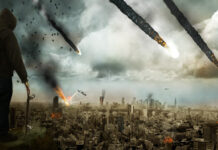If you put your ear up to your screen, listen to their tweets, or read between the lines, you can hear the panic.
It’s starting as a whisper, but it’s building. They are afraid Russia will win the war in Ukraine.
The panic starts on the other side of the Atlantic. Ukraine encourages it and amplifies it. They promise bigger Russian attacks, a new offensive, and publicize when missiles kill civilians or hit hospitals. They want to fight, but they know they can’t win without support, so they use social media and the mainstream media to plead their case. An unintended consequence is that helps incite panic.
It’s working. You can almost smell the panic of their neighbors. It’s in the air, like the smell of salt when you approach the ocean. Poland is panicking because they know Ukraine is all that stands between them and Russia. “Send tanks!” they say, “Send F-16s!” There are rumors of Polish troops in Ukraine fighting as mercenaries. Poland is also playing a huge role in the delivery of Western arms into Ukraine as most pass through the Polish border with Ukraine. Meanwhile, Poland is rebuilding their military as fast as they can.
Panic in Eastern Europe
Poland isn’t alone. Most of Eastern Europe is panicking for the same reason. Latvia, Estonia, Lithuania, even Slovakia and the Czech Republic. They remember what it is like to be under the Russian boot, and they sure as hell don’t want to go back to being part of the Soviet Union. They not only want to send tanks and jets to slow or stop the onslaught of the new Russian troops, they want more NATO troops on their land to make Putting think twice about invading.
Finland and Sweden are worried enough to join NATO. NATO has been around more than 70 years, but they waited until after the Ukraine invasion to join. If that’s not panic, it’s a high level of concern.
Germany isn’t panicking yet. Too soon to tell if they are naïve or just cautious.
It’s Happening Here, Too
The Biden Administration is also panicking. Their plan to sap the Russian forces and economy by giving Ukraine weapons and using sanctions appears to have stalled. That’s bad for Biden. If the Putin regime succeeds in Ukraine, it makes Biden look like a failure. Again.
Can you imagine running for re-election as the guy who “let” the Russian’s win? If it wasn’t bad enough that he ran from Afghanistan with his tail between his legs and left thousands behind, letting Russia get the best of him would be a knock-out blow to his campaign. You don’t have to be Donald Trump to craft a winning strategy around that talking point.
Beyond the immediate political fallout of Russia occupying Ukraine, such a move would make the U.S. and NATO look weak. That would have major repercussions around the globe. Just as we are strengthening our position with new agreements with Japan and the Philippines, our allies might question our ability to come to their defense. “But we never used our air force, navy, or our best weapons!” we would say. Still, they would wonder. Will we use our best weapons to protect them?
Russia winning would also give China a shot in the arm. Their military and economic adventurism will accelerate. The dollar would weaken and we would no longer be the sole superpower. Not only would Russia be back, they would be an even more attractive ally to China. This would recreate the bipolar world of the cold war with the Russia/China block against the U.S./Europe block. The Pacific would be very much in play and likely the scene of our next war.
The Great Unknown
There are two sides to the story of the Russian war in Ukraine.
One side says American and NATO actions pushed Russia into the corner until they had to invade. On the other side, they say Russia is trying to regain the power and landmass they lost in the fall of the Soviet Union.
My thinking is that neither is completely accurate. I think Russia has a history of attacking neighbors when the U.S. has a weak president or is distracted. After we bungled the pull-out from Afghanistan, Russia saw a weakness and struck, aiming to take over much of Ukraine’s industrial areas, nuclear power plants, and productive farming land while they had the opportunity.
Instead, they hit unexpected resistance but were in too deep to back out without losing face. Stuck in a bigger war than they expected, it has taken them a year to accept the facts on the ground and commit to winning. They are now fighting a long war of attrition and can outlast Ukraine.
There are also two points of view regarding how the war is going.
How the War Progresses
The Ukrainians would have you believe they are invincible, as long as we give them money and weapons. They will throw their people into the breach, if we arm and equip them. They had early success and launched a successful counteroffensive, but as their infrastructure gets destroyed, they sound frightened. The realities of a long ware are not pleasant when viewed from their perspective.
The Russians tell their people and anyone who will listen that they are regrouping and are in it to win it, even if it takes years. They are larger than the Ukraine and can field more soldiers. As the war drags on, Americans may lose interest or stop supporting the war. American leadership may change. China might open a second front, distracting NATO and splitting the U.S. forces. Russia can think long term. The U.S. thinks in election cycles.
The Nuclear Question
We also don’t know if Russia will resort to the use of nuclear weapons if they are losing. There are two schools of thought: They would not dare, says one. Putin will do anything, say another. The generals would never let Putin launch, says the first group. No one will stand up to him because he is too strong, says the other.
No one knows if Russia will use nukes. Chances are, Putin hasn’t decided yet.
Assuming they use nukes, no one knows what that will look like. Will it start with a nuclear test somewhere in Siberia as a warning? Will it be a tactical nuke exploded over Kyiv to take out their leadership? Or will Russian submarines launch to wipe out our Minute Men silos, followed by an all-out attack using 75 percent of the Russian missiles as bombers lift to the skies?
What will we do? Our response will depend on their attack. Will we use nukes first? No one knows that, either.
What to do?
People in Kyiv and Washington may be panicking. Heads of state and military officials across Eastern Europe may be panicking. That doesn’t mean we have to. Panic can cause people to do stupid things. Try to be the reassuring cool head that does smart things. Your best bet is to do what preppers do and hope for the best, but prepare for the worst.
Regardless of what you believe about why the war started, how it’s going or if it will be better or worse if Russia wins, you need to prepare for the worst-case scenario, which is the use of nuclear weapons. Follow the first rule of nuclear survival and don’t panic.








